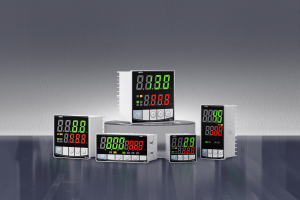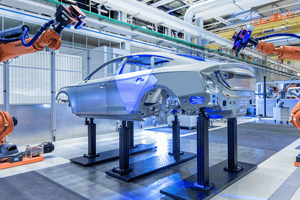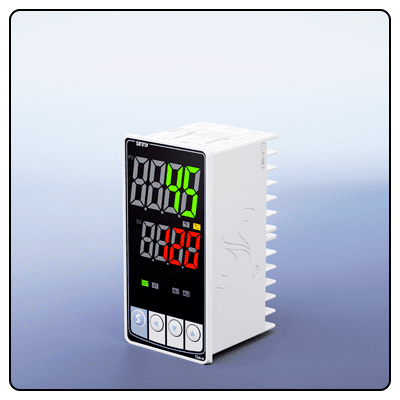Maximizing Quality with PID Temperature Controllers | Precise Process Regulation
Discover how PID Temperature Controllers enhance product quality by maintaining precise temperatures. In our in-depth article, we explore the many uses of Proportional-integral-derived technology across various industries, guaranteeing consistency, safety, and efficiency for optimal productivity levels.
1. Introduction
In industrial and commercial processes, maintaining precise temperature regulation must be emphasized; its importance directly translates into product quality, safety, and consistency. Among various temperature-regulating methods available today, PID (Proportional-Integral-Derivative) controllers have proven themselves superior owing to their precision and versatility, thus becoming indispensable tools in many applications.
2. PID Controllers from an Understanding Standpoint
At the core of the PID controller lies an intuitive yet complex concept: the constant calculation of error values as measured temperature differs from tdesired setpoint temperature, which is used as feedback data in deriving control actions that adjust the process as necessary.
* Proportional Control (P):
This element immediately minimizes error by modifying output proportionally to error magnitude.
* Integral Control (I):
Integral control aims to correct any accumulations over time by making corrections that lead to zero steady state error errors. It ensures even minute discrepancies are corrected, resulting in zero steady state errors at any given point in time.
* Derivative Control (D):
This component predicts future errors based on their rate of change, enabling preemptive corrections that prevent overshooting or oscillations from happening.
PID controllers utilize three elements in tandem to maintain temperature within narrow margins for product quality - providing optimal conditions.
3. PID Controllers in Cooling Systems
PID temperature controllers can be invaluable tools in industries where products are susceptible to temperature variations, like pharmaceuticals and food and beverage manufacturing, like pharmaceuticals or food and beverages. Their precision ensures products don't spoil while remaining within safe consumption parameters.
* Preventing Product Spoilage:
By continuously regulating cooling output, PID controllers minimize temperature deviations that could result in bacteria growth or product degeneration.
* Efficiency in Cooling:
PID controllers maximize efficiency in cooling units by optimizing energy use and equipment wear, leading to cost savings and environmental benefits that ultimately translate into cost reduction and environmental improvement.
4. PID Controllers in Heating Systems
PID controllers play a pivotal role in processes requiring heating, such as metalworking or plastic molding, by maintaining uniform temperatures across an operation. This directly impacts structural integrity and quality.
* Consistent Manufacturing Quality:
Fluctuations in heating can result in imperfect products; PID controllers ensure a constant temperature profile to achieve this, leading to uniform product quality and uniform product results.
* Optimizing Cooking and Comfort:
PID controllers help commercial kitchens and HVAC systems achieve maximum food quality and occupant comfort by controlling temperatures to meet desired settings and maintaining desired temperatures for maximum cooking productivity and comfort.
5. Advantages of PID Controllers over Other Temperature-Regulating Methods
PID controllers set themselves apart from other temperature management methods by employing advanced algorithms with unparalleled precision and adaptability, offering unparalleled precision and adaptability for temperature regulation.
* Minimized Temperature Variance:
PID controllers offer greater temperature regulation compared to basic thermostats, which only provide control of heating or cooling elements; PID controls use adjustable power output to deliver heating/cooling power directly, producing minimal temperature variance.
* Rapid Response to Disturbances:
PID controllers offer fast compensation of external temperature disturbances that might compromise process integrity, helping ensure business operations run without incident.
* Energy Efficient Solutions:
PID controllers contribute significantly to energy savings and lower operational expenses by optimizing power use. By making better use of resources available to them, PID controllers enable significant energy efficiency gains as well as lower operational expenses.
6. Real World Applications of PID Temperature Controllers
PID temperature controllers are essential for assuring product quality in small laboratories and larger industrial complexes.
* Pharmaceuticals:
Precise temperature controls are critical in pharmaceutical production to ensure product efficacy and stability.
* Food Production:
PID controllers aid food manufacturers by maintaining optimal temperatures during fermentation processes, baking and refrigeration - directly impacting taste and shelf life of their produce.
* Plastics Industry:
PID controllers in injection molding ensure materials reach an optimum temperature to produce quality product formation.
7. Conclusion
PID temperature controllers have become indispensable assets to various industrial and commercial processes, marking an extraordinary advancement in product quality control. Their precise temperature regulation enhances product quality and consistency and contributes to sustainable practices through energy conservation.
* Improved Product Quality: PID technology's finely controlled precision ensures products meet stringent quality standards for increased customer satisfaction and reduced waste production.
* Future of PID Controllers: As technology progresses, we can expect further advancements to PID controllers that make them even more energy-efficient and integrated into smart systems.
- Seamless Integration of PID Controllers with PLC Systems
- Mastering Industrial Precision: Maximizing Efficiency with PID Temperature Controllers






















